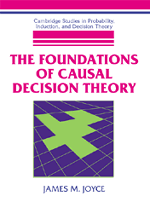Book contents
- Frontmatter
- Contents
- Preface
- Introduction: A Chance to Reconsider
- Chapter 1 Instrumental Rationality as Expected Utility Maximization
- Chapter 2 Decision Problems
- Chapter 3 Savage's Theory
- Chapter 4 Evidential Decision Theory
- Chapter 5 Causal Decision Theory
- Chapter 6 A General Theory of Conditional Beliefs
- Chapter 7 A Representation Theorem for Causal Decision Theory
- Chapter 8 Where Things Stand
- References
- Index
Chapter 5 - Causal Decision Theory
Published online by Cambridge University Press: 25 July 2009
- Frontmatter
- Contents
- Preface
- Introduction: A Chance to Reconsider
- Chapter 1 Instrumental Rationality as Expected Utility Maximization
- Chapter 2 Decision Problems
- Chapter 3 Savage's Theory
- Chapter 4 Evidential Decision Theory
- Chapter 5 Causal Decision Theory
- Chapter 6 A General Theory of Conditional Beliefs
- Chapter 7 A Representation Theorem for Causal Decision Theory
- Chapter 8 Where Things Stand
- References
- Index
Summary
Evidential decision theory requires agents to choose actions that provide them with good evidence for thinking that desirable outcomes will occur. While this is usually sound advice, there are decision problems in which the pursuit of good news can lead to less than optimal results. This happens when there is a statistical or evidential correlation between the agent's choices and the occurrence of certain desirable outcomes, but no causal connection between the two. When the evidential and the causal import of actions diverge in this way, the evidential theory tells decision makers to put the pursuit of good news ahead of the pursuit of good results. Many philosophers, I among them, see this as a mistake. Rational agents choose acts on the basis of their causal efficacy, not their auspiciousness; they act to bring about good results even when doing so might betoken bad news.
In this chapter we examine causal decision theory, the version of expected utility theory that seeks to analyze the instrumental value of actions by appealing to their ability to causally promote desirable results. What we will see is that, even though evidential and causal decision theorists do disagree about the way in which we should evaluate actions, there is an underlying unity in their approaches to decision making. We will exploit this unity in subsequent chapters to prove a Bolker-style representation result for causal decision theory.
- Type
- Chapter
- Information
- The Foundations of Causal Decision Theory , pp. 146 - 180Publisher: Cambridge University PressPrint publication year: 1999

